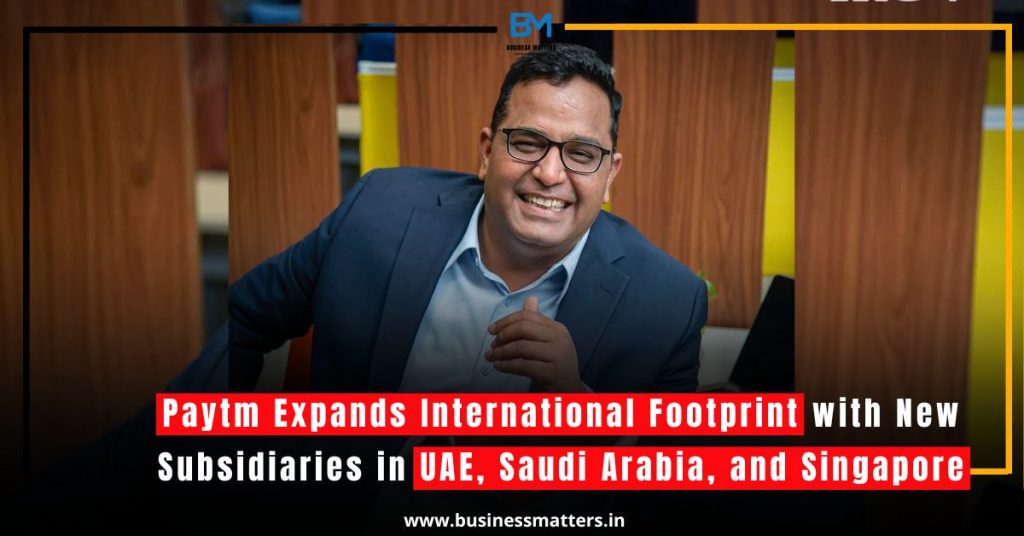Global Expansion Strategy: Tapping into Emerging Fintech Hubs
Indian fintech giant Paytm, under the leadership of its founder Vijay Shekhar Sharma, is actively pursuing its ambitious plan to expand its operations beyond India. In a recent announcement, the company revealed plans to establish three new subsidiaries in key international markets: the UAE, Saudi Arabia, and Singapore. This move is part of Paytm’s overarching strategy to diversify its revenue streams and solidify its presence in emerging global fintech hubs.
The company will be setting up these subsidiaries under its wholly-owned subsidiary, Paytm Cloud Technologies Limited (PCTL), which will act as the parent company for these new ventures. Once operational, these new subsidiaries will further strengthen Paytm’s foothold in the Middle East and Southeast Asia, regions that are witnessing rapid digital transformation in financial services.
By expanding its footprint in these countries, Paytm is not only positioning itself to capitalize on growth opportunities in digital payments but also aiming to provide a broad range of fintech solutions, including mobile wallets, lending services, and wealth management products to a global customer base.
The UAE, Saudi Arabia, and Singapore were specifically chosen due to their rapidly growing fintech ecosystems. Each of these regions is investing heavily in digital infrastructure and moving towards greater adoption of electronic payments. As part of the UAE’s push to position itself as a global fintech hub, the country has seen a substantial increase in demand for digital payment solutions, making it an ideal market for Paytm’s technology-driven services.
Similarly, Saudi Arabia’s Vision 2030 initiative is propelling the nation’s efforts to modernize its economy, which includes boosting digital payment adoption. Singapore, on the other hand, is widely regarded as one of the most advanced fintech centers globally, with a well-established regulatory framework that fosters innovation and attracts leading fintech players.
Leveraging Cloud-Based Solutions for Global Growth
As Paytm embarks on this new international journey, it plans to capitalize on its technological strength, particularly its cloud-based infrastructure. Cloud technology has allowed Paytm to offer scalable and secure digital payment solutions, and the company intends to replicate this success across these new regions.
The cloud-based model will enable Paytm to provide real-time, seamless financial services to businesses and consumers, making it an appealing choice for markets that prioritize speed, efficiency, and reliability.
The fintech giant’s global offering will include a comprehensive suite of services such as payment gateway solutions, cross-border remittances, mobile wallet services, and digital lending products. As more businesses and consumers in these international markets transition to digital financial services.
Paytm’s infrastructure will help address the rising demand for secure and cost-effective solutions. The company’s broad product offerings aim to cater to both the consumer and enterprise segments, providing services ranging from basic digital payments to more complex financial products like credit and wealth management solutions.
By establishing a local presence in these regions, Paytm intends to ensure that its services are finely tuned to meet the unique needs and preferences of the consumers and businesses in each market. Through these subsidiaries, Paytm plans to tailor its offerings in line with local regulatory requirements, cultural preferences, and market dynamics, making it a highly localized player in global markets.
Strategic Investments and Partnerships to Fuel International Expansion
In addition to its organic growth through setting up subsidiaries, Paytm is also keen on leveraging inorganic strategies to accelerate its international expansion. The company is actively exploring mergers and acquisitions (M&A) opportunities in these regions to further strengthen its capabilities and enhance its market penetration. By acquiring or partnering with local firms that have established consumer bases, Paytm hopes to build a stronger foothold in these competitive markets.
Strategic partnerships will also play a key role in Paytm’s growth strategy. The company is open to forming alliances with local businesses, financial institutions, and technology firms to drive growth and improve its service offerings. These partnerships will not only help Paytm tap into existing customer bases but also allow it to leverage local expertise in navigating the regulatory and business landscapes of each country.
Moreover, Paytm is considering seeking local licenses where applicable. Obtaining these licenses will help the company comply with regional regulatory frameworks and enhance the credibility of its services. Local licenses will also allow Paytm to more effectively tailor its financial products to the regulatory requirements of each region, which is essential for smooth and sustained operations.
Paytm’s Path Towards Becoming a Global Fintech Leader
By expanding into the UAE, Saudi Arabia, and Singapore, Paytm is setting the stage for its transformation into a global fintech powerhouse. This strategic move allows the company to diversify its revenue sources, tap into emerging markets, and accelerate its growth trajectory.
Furthermore, the expansion into these regions represents Paytm’s commitment to offering innovative, tech-driven solutions that cater to the evolving needs of global consumers and businesses.
As Paytm continues to innovate and scale its international business, it aims to enhance its competitive edge in the rapidly evolving global fintech landscape. The company’s goal is to provide best-in-class digital financial services that foster inclusion and innovation, helping to reshape the way people and businesses engage with financial products around the world.
This international expansion, fueled by a blend of technology, strategic partnerships, and targeted acquisitions, marks an important milestone in Paytm’s quest to become a true leader in the global fintech space.


